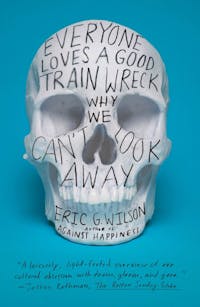Everyone Loves a Good Train Wreck
Why We Can't Look Away
 Download image
Download image
ISBN10: 0374533709
ISBN13: 9780374533700
Trade Paperback
224 Pages
$17.00
Why can't we look away?
Whether we admit it or not, we're fascinated by evil. Dark fantasies, morbid curiosities, Schadenfreude: As conventional wisdom has it, these are the symptoms of our wicked side, and we succumb to them at our own peril. But we're still compelled to look whenever we pass a grisly accident on the highway, and there's no slaking our thirst for gory entertainments like horror movies and police procedurals. What makes these spectacles so irresistible?
In Everyone Loves a Good Train Wreck, the scholar Eric G. Wilson sets out to discover the source of our attraction to the caustic, drawing on the findings of biologists, sociologists, psychologists, anthropologists, philosophers, theologians, and artists. A professor of English literature and a lifelong student of the macabre, Wilson believes there's something nourishing in darkness. "To repress death is to lose the feeling of life," he writes. "A closeness to death discloses our most fertile energies."
His examples are legion, and startling in their diversity. Citing everything from elephant graveyards and Susan Sontag's On Photography to the Tiger Woods sex scandal and Steel Magnolias, Wilson finds heartening truths wherever he confronts death. In Everyone Loves a Good Train Wreck, the perverse is never far from the sublime. The result is a powerful and delightfully provocative defense of what it means to be human—for better and for worse.
Reviews
Praise for Everyone Loves a Good Train Wreck
"A leisurely, light-footed overview of our cultural obsession with doom, gloom, and gore."—Joshua Rothman, The Boston Sunday Globe
"Wilson is provocative, entertaining, and above all honest."—Chris Tucker, The Dallas Morning News
"In the teeming ranks of the American Professoriat, you could argue that Eric G. Wilson is among those most palpably needed by the world at large."—Jeff Simon, The Buffalo News
"Wilson makes a strong case that humans are natural-born rubberneckers . . . A hybrid of memoir, journalism and theory, Wilson's book investigates what this impulse tells us about ourselves and how it might inspire constructive reactions like compassion."—Kevin Canfield, The Star Tribune (Minneapolis)
"Eric G. Wilson's smart, probing new book Everyone Loves a Good Train Wreck: Why We Can't Look Away sets out to explain what lies beneath our collective fascination with death and suffering . . . the book's slim, peripatetic chapters cover an awful lot of erudite territory, as Wilson draws ideas and research from a delightful grab bag of academics, artists and thinkers. Aristotle, Freud, Kant, Goya and Hardy all make appearances, alongside an assortment of sociopaths and serial murderers . . . Everyone Loves a Good Train Wreck's explanation for the rise of dark tourism provides, perhaps, the best response to Wilson's two questions. That is, we're curious about death and suffering because we want 'truth (we all die), beauty (we had better appreciate people and plants and animals while they last) and goodness (we all suffer, so let's take care of one another).'"—John Wilwol, NPR.org
BOOK EXCERPTS
Read an Excerpt
1.
"Don't look."
That's what she asked, more than once. I heard her distinctly each time, and told myself I should oblige, and even once partially turned my head in her direction, but I just couldn't take my eyes off the screen....


